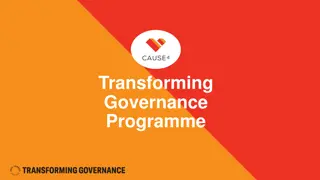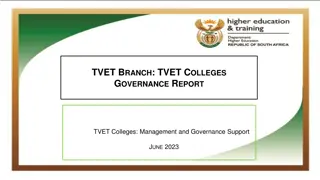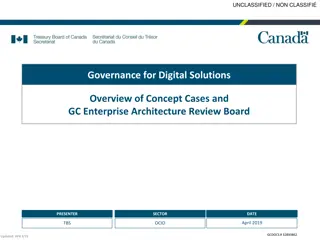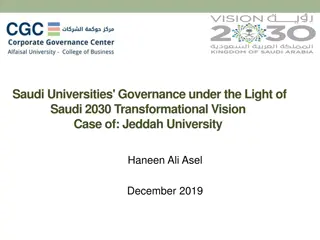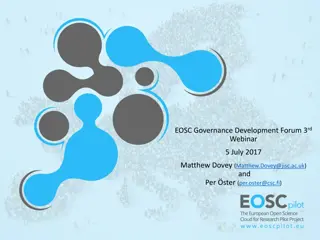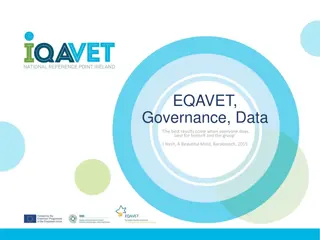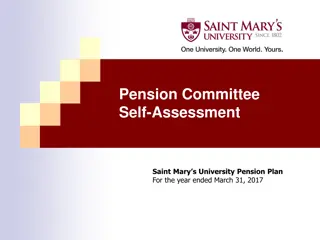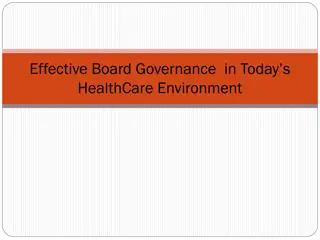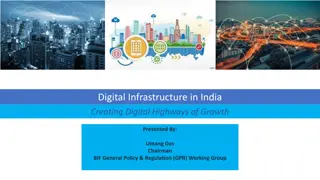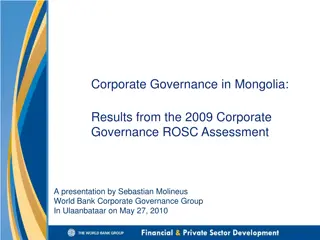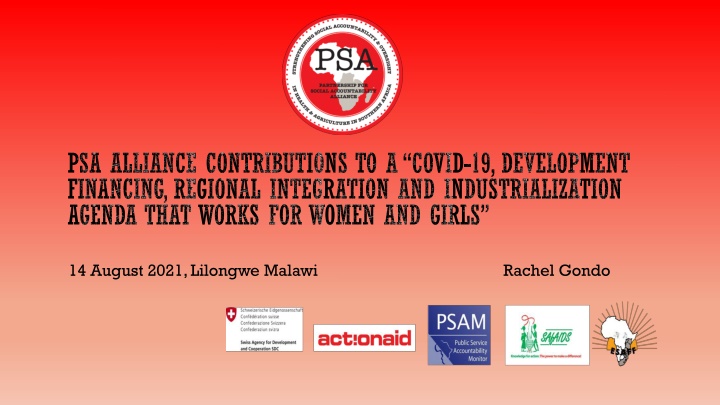
Governance for Digital Solutions Overview
This content provides an overview of governance for digital solutions, including the concept cases and GC Enterprise Architecture Review Board. It explains the purpose of the session, the definition of Enterprise Architecture (EA), the GC's definition of EA, and the importance of strategic planning in achieving organizational objectives.
Download Presentation

Please find below an Image/Link to download the presentation.
The content on the website is provided AS IS for your information and personal use only. It may not be sold, licensed, or shared on other websites without obtaining consent from the author. If you encounter any issues during the download, it is possible that the publisher has removed the file from their server.
You are allowed to download the files provided on this website for personal or commercial use, subject to the condition that they are used lawfully. All files are the property of their respective owners.
The content on the website is provided AS IS for your information and personal use only. It may not be sold, licensed, or shared on other websites without obtaining consent from the author.
E N D
Presentation Transcript
PSA ALLIANCE CONTRIBUTIONS TO A COVID-19, DEVELOPMENT FINANCING, REGIONAL INTEGRATION AND INDUSTRIALIZATION AGENDA THAT WORKS FOR WOMEN AND GIRLS 14 August 2021, Lilongwe Malawi Rachel Gondo
WHO WE ARE: Consortium of organisations led by - ActionAid International and including the Public Service Accountability Monitor (PSAM) of Rhodes University, Eastern and Southern Africa Small-Scale Farmers Forum (ESAFF) and SAfAIDS - We are implementing the project Strengthening Social Accountability and Oversight in Health and Agriculture in Southern Africa , with support from the Swiss Agency for Development and Cooperation (SDC). - Our efforts are to improve social accountability and gender-responsiveness in public resource management in health and agricultural services across five countries (Malawi, Mozambique, Tanzania, Zambia and Zimbabwe), contributing to the realisation of SADC commitments on HIV, sexual and reproductive rights (SRHR) and food security in the Southern African region. Consortium Project Manager, ActionAid International, julie.middleton@actionaid.org . www.copsam.com/psa/ PSAM www.psam.org.za ; SAfAIDS www.safaids.net ; ESAFF www.esaff.org ; and ActionAid www.actionaid.org . 2
WHAT ARE WE SEEING: The COVID-19 crisis brought and is still presenting new challenges to women and girls around the world. exacerbated key sexual and reproductive health (SRH) inequalities and vulnerabilities. Close to 75 million learners are out of school, 24% of pregnancies are ending in abortion, new HIV infections are increasing among young women and border closures have led to limited supply of contraceptives (which may have led to an increase in teenage pregnancies). Where there is no social protection, evidence shows that there is a 20% surge in GBV , decrease in access to health care for the LGBTI community and increase in violence . UNAIDS 2021 This current crisis has demonstrated the importance of consistent and sufficient public investment and accountable governance of health services, domestic food security, and social protection systems. Women, who form the majority of small-scale food producers, primary caregivers and health workers are already invariably shouldering the heaviest burden. 3
OUR REALITY: COVID-19 has not only exacerbated weaknesses in African states public financial management (PFM) systems but in some cases has curtailed the abilities of many citizens and elected representatives to exert much-needed accountability and oversight. The pandemic has vividly exposed recurrent and novel corrupt practices. Our interventions, therefore, must if we are to safeguard precious resources in the long-term recognize that the problem is both about adequate health responses as it is about public resource management (PRM) systems reform. PFM refers to the way in which governments manage revenue and expenditure and impact of such public resources on the economy and society. Gender-responsive budgeting which is built in into PFM, ensures that the needs and interests of individuals from different social groups (gender, age, race, income, ethnicity, location) are addressed in expenditure and revenue policies . 4
WE ARE IN DIRE NEED OF SOCIAL ACCOUNTABILITY IN PUBLIC RESOURCE MANAGEMENT MATTERS : At the core we want to see SADC Governments improve skills and capacities to provide accessible accounts (narratives) to us SADC citizens of current and future plans to create more resilient systems and to bounce back better How? Accountability is the bedrock of the human rights framework, itself a system of norms and standards that govern the relationship between duty bearers in authority and rights holders affected by their actions. This accountability relationship has 3 critical features: The obligation of those in authority to take responsibility for their actions, The obligation of those in authority to explain and justify PRM decisions and actions to those affected, In instances where decisions and actions are contrary to the norms governing the accountability relationship those in authority are subject to some form of enforceable sanction with timely corrective action taken. 5
A FEW INSIGHTS ON CAPACITIES SADC GOVERNMENTS CAN IMPROVE ON: It is our opportunity to innovate and be creative in response to this crisis. Leveraging technology to go beyond gender mainstreaming to measuring impact: You cannot solve a problem that you don't understand. This is critical when it comes to collecting and using data to make informed, evidenced-based decisions in implementing an agenda that responds to the needs of women and girls. 1. SADC governments invest in gender responsive public resource management practices (which incorporate Gender Responsive Budgeting-GRB). These include the requirement that budget policies be reviewed to understand their planned and unintended impacts on gender equality and equity and propose recommendations to inform future policies. Formulating the budget in a gender responsive way Linking gender responsive policies with adequate budgetary funds Executing the budget in a way that benefits women men girls and boys equitably Monitoring the impacts of expenditure and revenue raising from a gender perspective (Anwar, Downs and Davidson 2016; PEFA GRPFM 2020) 6
2. Leveraging partnerships and collaboration: The absence of formal Non State Actor (NSA) engagement mechanisms has resulted in very low awareness of the benefits of SADC regional integration among stakeholders and limited NSA involvement in SADC affairs. SADC Secretariat and member states should establish platforms and processes, including publicly sharing plans and reports, at regional and national levels to ensure NSAs (inclusive of women, youth, workers and smallholder producers) are able to engage substantively in the implementation and monitoring of the Regional Indicative Strategic Development Plan (RISDP 2020-2030), built upon the principles of social accountability. SADC Secretariat and member states should establish, strengthen and operationalize a NSA engagement mechanism at regional level and the SADC National Committees in each member state, within the timeframes stipulated in the RISDP implementation plan. SADC member states should strengthen social accountability through safeguarding human rights, including the freedoms of expression, assembly and association, and empowering state integrity and oversight mechanisms, to ensure all people of the region can fully and substantively engage in democratic processes. 7
3. Promote sustainable financing: SADC countries need to provide a sustainable framework for generating revenue to fund sectors in a gender responsive manner, such as raising revenue through tax incentives because they are predictable and sustainable and do not come with conditions. It is also important for governments to close loopholes that lead to revenue losses, in order to expand the domestic pocket allocated to priority social (health/education/agriculture) services. There is a need to update double taxation agreements (DTAs) to make use of the United Nations (UN) tax treaty model, which gives taxing rights to developing countries and the SADC model treaty, which provides a model to raise revenue. SADC countries must make holistic efforts to fight IFFs by reviewing and enacting legislation that provides for investigation and prosecution of cross-border financial crimes, facilitating review of regressive tax treaties and promoting information sharing to mitigate IFF-related information asymmetry. SADC must actively participate in the development of international tax rules, especially on technological tax, as well as implement tax incentive protocols and adoption of model DTAs. SADC member states should facilitate transparency in public resource management (PRM), information sharing and effective social accountability systems as well as ensure the implementation of recommendations by supreme audit institutions with respect to mismanagement and irregularities in PRM to ensure better outcomes for women and girls. 8

